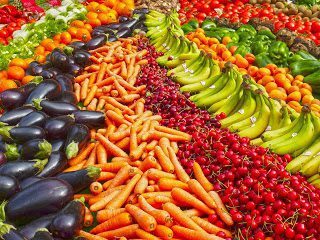
Alcohol and drug abuse can create a number of health problems, including severe nutritional deficiencies. Empty calories from alcohol fill the body up without providing the fuel it needs, and many illegal drugs act as appetite suppressants.
In the early stages of recovery, paying close attention to your diet can help you heal some of the past damage caused by substance abuse. The following tips provide a general guideline for a healthy diet, but you can also try keeping a food journal to learn more about how what you eat affects your energy level, mood, and cravings.
Stay Hydrated
The human body is 2/3 water by weight, so dehydration can cause serious problems with your nervous, circulatory, and respiratory systems. During withdrawal, staying hydrated can help reduce the severity of detox symptoms such as constipation, headaches, and stomach upset.
Ideally, you should try to drink one half to one ounce of water for each pound of body weight. For example, a 200-pound man should try to drink 100 to 200 ounces of water per day.
One problem people often have with the suggestion to drink more water is that they get bored with the taste of plain water. Infused water made from fresh fruit and herbs is a great option, as is using ice cubes made from no-sugar-added fruit juice to add a hint of flavor to your water. There are also flavored Stevia drops you can use to sweeten your drink without adding empty calories.
Eat the Rainbow
Current federal dietary recommendations suggest that you fill half your plate with fruits and vegetables at each meal. However, it’s important to choose a wide variety of fruits and vegetables instead of sticking to the same basic choices.
A great way to make sure you’re getting a full range of nutrients is to try to eat a rainbow of fruits and veggies each day. Every color of the rainbow offers different nutritional benefits. For example, orange and yellow citrus fruits are rich in antioxidants to support your immune system. Red fruits and vegetables, such as apples, raspberries, tomatoes, and red onions, contain lycopene and anthocyanin to improve your memory and boost heart health. Green leafy veggies like kale and spinach are a source of chlorophyll to help rid the body of harmful toxins and promote detoxification in the liver.
Fill Up with Whole Grains
Whole grains are an excellent source of insoluble fiber, which helps you control your appetite and keep your digestive system in order. Unlike refined grains that have been significantly modified from their natural composition, whole grains contain the original bran, germ, and endosperm.
Common refined grains include white brain, white rice, white flour, and regular white pasta. Examples of whole grains include whole wheat bread, brown rice, oatmeal, and air-popped popcorn, as well as more adventurous options like quinoa, bulgur, millet, and buckwheat.
Snack Smart
Snacking is important to keep your blood sugar stable, but it’s smart to choose snacks that will fill in the nutritional gaps in your diet instead of reaching for candy bars, potato chips, or fast food when you get hungry in the middle of the day.
A healthy snack would be one that combines several different food groups. For example, you can try making your own homemade trail mix by combining almonds, walnuts, or sunflower seeds with your favorite dried fruit and whole grain granola. Portion 1/4 cup serving sizes into plastic sandwich bags or reusable containers so you always have a healthy snack ready to go. A mixture of honey and almond butter or natural peanut butter is another easy-to-prepare snack option that makes a great dip for fresh fruits and veggies, as well as a topping for bagels, rice cakes, and whole grain crackers.
If you’re concerned about nutritional deficiencies, it may seem like taking dietary supplements would be an easy way to give your body a boost. However, it’s always preferable to get the fuel your body needs through a balanced diet. The vitamins and minerals in supplements are synthetically created and thus harder for the body to absorb than what’s found naturally in food. Some supplements may also interact with certain prescription medications.
Talk to your doctor about any specific nutritional concerns you may have before deciding to use dietary supplements. If your doctor believes a supplement may be appropriate, he or she can help you choose one that best fits your needs.
By Dana Hinders
Sources:
Many Hands Sustainability Center
TheFix.com
MedlinePlus






